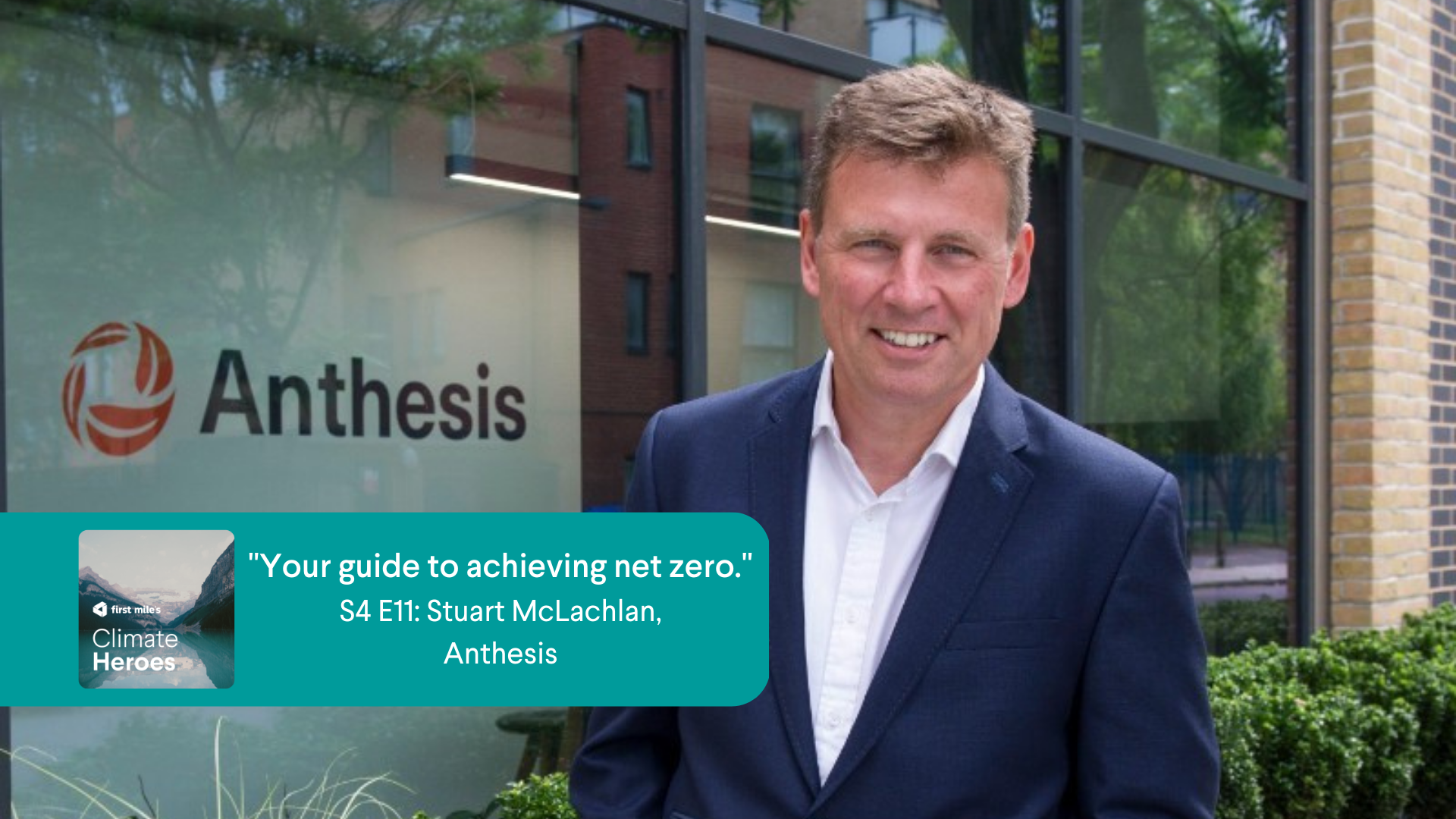Achieving net zero is a challenge all businesses share.
Recently, our CEO and host of First Mile's Climate Heroes podcast, Bruce Bratley, was joined by sustainability expert Stuart McLachlan (co-founder and CEO of Anthesis) to discuss this crucial topic. You can listen to the podcast in full here.

As well as covering the ever-changing world of environmental, social and governance compliance (ESG), Bratley and McLachlan talk about McLachlan’s new book, written with Dean Sanders (Chief Enterprise Officer at Anthesis): The Adventure of Sustainable Performance: Beyond ESG Compliance to Leadership in the New Era (Wiley).
What does net zero mean?
Put simply, net zero means not adding to the greenhouse gas emissions (GHG) that are causing global warming. We’ll achieve net zero when we achieve a balance between the GHG emitted into the atmosphere and the GHG removed, which can be accomplished by implementing a sustainable business strategy.
The catastrophic effects of global warming can only be avoided if we drastically reduce our emissions – ideally to 1.5°C in line with the Paris Agreement.
The UK has committed to reaching net zero by 2050.
What challenges do businesses face in reaching net zero?
‘…to try to get leaders to move from managing the strongholds [such as the fossil-fuel sector] into a place of transition where a lot of those strongholds are going to start to disintegrate… This is a place that leaders don’t want to go to.’ (Stuart McLachlan)
McLachlan tells us that businesses only really woke up to the reality of the climate change crisis three or four years ago. He’s seen business leaders respond in one of two ways:
· recognising that we’re going into a time of peril and disruption, and acknowledging that we’ve got to embrace it, or
· trying to move the business and its stakeholders into a fantasy zone – for example, claiming climate science isn’t real or using greenwashing tactics.
What's been holding businesses back from achieving net zero?
‘…. the market was being provided with a jigsaw puzzle with no picture on the lid, or the wrong picture on the lid, and with the wrong pieces of the jigsaw in the box. Businesses were being given the equivalent of this and told: “Go and build something useful.”’ (Stuart McLachlan)
When the sustainability consultancy Anthesis was first set up, in 2013, the group looked at why:
· there wasn’t enough action to achieve net zero
· even when there was action, there was such a high failure rate
Their conclusion? That there was a lack of robust data and that organisations were trying to implement sustainability in silos.
Is the picture on the jigsaw box clearer now? McLachlan thinks we’re still in a transition zone and it will take time to see what a new era might look like.
How can your business reach net zero?

In this rapidly changing world, companies must transition to a more sustainable and eco-friendly way of doing business. For many companies, sustainable development is just as important as economic development.
· Find out more about your scope emissions
· Take an emissions inventory: this government guide will help you find out how to go about it
· Set net-zero targets using science-based and defined near- and long-term targets for reaching net-zero
· Reduce your GHG emissions: for example, switch to 100% renewable gas and electricity and ensure you have efficient recycling systems in place
· Offset residual emissions with carbon offsetting
How is Anthesis helping businesses achieve net zero?

‘I’ve always been a believer that business is an institution that is both powerful and agile and therefore needs to be lent on to be an influence in terms of the change we want to make in the world.’ (Stuart McLachlan)
Anthesis was born out of frustration and the desire to 'make sustainability happen'. It’s now a global sustainability specialist and certified B-Corp that supports its clients to make the transition to a decarbonised and more sustainable future. It focuses on analytics, solutions design and implementation.
What's The Adventure of Sustainable Performance all about?
Written for executives, managers, directors and other business leaders, this is a how-to guidebook to implementing value-add sustainability programmes. It includes interviews with business leaders and inspirational stories.
The title reflects two things:
1. That moving to net zero is an adventure and with every adventure there come hopes and fears and a level of danger — but also a huge amount of opportunity.
2. That sustainable performance is a model to show what the new era might look like.
The authors guide the reader through the challenges of Environmental, Social and Governance (ESG) compliance (ESG refers to the three key factors used to measure the sustainability and ethical impact of a business). And they show the huge potential of net zero, circular business models and a more inclusive capitalism.
What are some sustainable business practices you can implement to improve environmental performance?
Sustainable business practices encompass both economic and environmental sustainability, acknowledging the link between profitability and minimising your businesses environmental footprint.
By implementing sustainability objectives and practices, businesses can reduce their environmental impact, reduce carbon emissions, conserve resources, and promoting eco-friendly initiatives.
This can include using in energy-efficient technologies, optimizing your supply chain to reduce waste, and investing in renewable energy sources. Sustainable businesses also prioritise economic sustainability by focusing on long-term profitability through innovative solutions, cost-saving measures, and ethical business conduct that filters through to the company culture.
By embracing sustainable practices, businesses can not only contribute to a healthier planet but also create a more resilient and prosperous future for themselves and future generations.
How can First Mile help you reach net zero?

First Mile can help you become a greener business and can offer 100% renewable gas and electricity that won’t cost the Earth. You can boost your sustainability credentials by using our zero-to-landfill services.
What's First Mile doing to achieve net zero?
We’re not all talk and no action! Our primary goal is to make it easy for businesses to recycle more and therefore avoid carbon emissions. Even our vehicles are smart enough to avoid polluting the planet.
Last year, our sustainable business practices helped us win the Contribution to Achieving Net Zero Award in recognition of our carbon savings.
And we’re incredibly proud to be one of the first businesses in the waste management industry to become B Corp Certified.
You can read more about our environmental sustainability achievements in our latest Sustainability Report.


